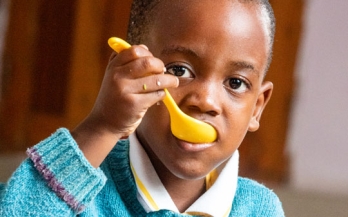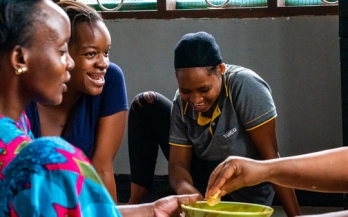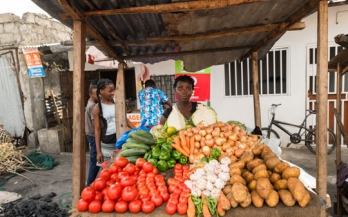The two-way relationship between food systems and climate creates opportunities for action contributing to climate mitigation, adaptation, resilience, and human health co-benefits, alongside a range of positive socioeconomic outcomes, making food systems transformation for nutrition and climate a key strategy to accelerate progress towards the Sustainable Development Goals (SDGs) and the Paris Agreement.
At the 77th World Health Assembly in Geneva, Global Alliance for Improved Nutrition (GAIN) voiced its support for the WHO Global Strategy for Food Safety and reducing the risks in traditional markets.
As thousands congregate in Iowa for the 2023 Borlaug Dialogue to search for ways to end global hunger and celebrate this year’s World Food Prize Laureate, his words ring truer than ever.
50 organisations representing the global nutrition and child health communities are calling on the executive board of the WHO to support the resolution "Accelerating efforts for preventing micronutrient deficiencies, spina bifida and other neural tube defects through safe and effective food fortification."
COP27 was not the first time nutrition and climate have been mentioned in the same breath at a COP. That was in Paris in 2015 and no one really listened. Timing is everything and in Sharm El Sheik seven years later the timing was right.
Healthy and sustainable food must be made more accessible, available, and affordable for all by governments and the private sector. Additionally, COP27 must address a comprehensive food systems transformation, including a focus on healthy and sustainable diets.
G7 Development Minister’s communique and the Chair’s Summary – Session 5: "Response to Multiple Crises on the African Continent – focusing on Food Security". The Zero Hunger Coalition and Private Sector Pledge have received strong support from the Communiqué 'Achieving the Sustainable Development Goals in times of multiple crises' issued on 19 May 2022 by the G7 Development Ministers.
Today GAIN presents its statement on food safety to the 75th World Health Assembly taking place in Geneva. GAIN aims to make nutritious safe foods more desirable, available, and affordable for all. The new WHO global strategy for food safety launched today is an important milestone in linking the objectives of food safety, nutrition, and smart development, for if food isn’t safe, it isn’t food.
The war in Ukraine is a catastrophe for that country and for the world. The loss of food production and exports from Ukraine (and to some extent Russia) will push world food prices up as the lack of supply fails to meet demand. High energy prices due to the loss of production, trade and the sanctions imposed will do the same, making food production, distribution and preparation more costly. Higher food and fuel prices will lower people’s income for other necessities such as clean water, sanitation and health care.
The African Union and African Heads of State and Governments have designated 2022 as the Year of Nutrition for Africa. We, GAIN’s country leaders in Ethiopia, Kenya, Tanzania, Nigeria and Mozambique, applaud this initiative simply because while there has been a lot of progress across Africa, more needs to be done, in particular to secure the investments needed to implement a nutrition action plan that reduces malnutrition across the continent.










